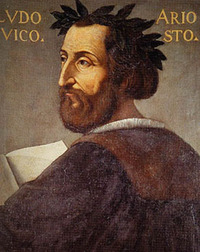



Boiardo died later in the same year-the incomplete Book 3 was published posthumously in 1495-and did not see the extent of the disaster that was to come. The unfinished third book of Boiardo’s poem also breaks off at the prospect of war, in this case the new arrival in Italy of the Gauls, that is, the invading French troops of Charles VIII in 1494, which began the long calamitous train of Italian wars that would end with foreign domination over the peninsula. It is an open ending whose external cause is the war that broke out between Boiardo’s Ferrara and Venice in 1482. It gave an ending to the two-book version of the Innamorato published in 1482–1483. They carry Ariosto’s own message of dynastic survival and cultural hope.Ītalante and the end of the 1482–3 Orlando InnamoratoĬanto 31 of Book 2 of the Orlando Innamorato concludes the last book of the poem that Boiardo finished during his lifetime. 2 Built by a different magic, the palaces of Gonzaga Mantua and Este Ferrara near the poem’s end in cantos 42–43 (38–39 in 1516), appear built to last. In making them do so, Ariosto announces that his poem will confront the Italian historical situation in a way that the Innamorato could not or would not do, and he suggests just how much of Boiardo’s Italy itself has been swept away in the foreign invasions of the peninsula that began in 1494. The palaces and their enchantments successively vanish-and so, as we shall see, does Cassandra’s pavilion-tapestry at the end of the Furioso.

The enchanter (and through him the predecessor poet Boiardo) continues to detain and protect the heroes of the Furioso in magic palaces until halfway through the poem, in canto 20, the exact midpoint, in its forty-canto 1516 version. Writing two and three decades later in this history, among new political facts on the ground, Ariosto doubles down on the figure of Atlante in order to make the Furioso a critique as well as a continuation of the Innamorato. 1 Both Atalante and Boiardo shield the Innamorato’s Carolingian heroes from their destined deaths by suspending them in the magic of romance adventure, and Boiardo explicitly links this strategy to his poem’s ultimate inability to face up to the historical crises and warfare raging outside it in late Quattrocento Italy and threatening the Este duchy of Ferrara. It focuses on the enchanter Atlante, who, under the name of Atalante, already stood in for the poet Boiardo in the Innamorato. This essay re-examines the relationship of Ariosto’s Orlando Furioso (1516) to the predecessor poem it continues and completes, Matteo Maria Boiardo’s Orlando Innamorato (1482–3 1495).


 0 kommentar(er)
0 kommentar(er)
